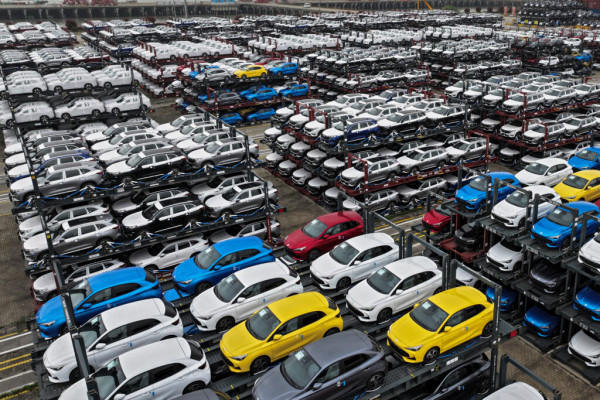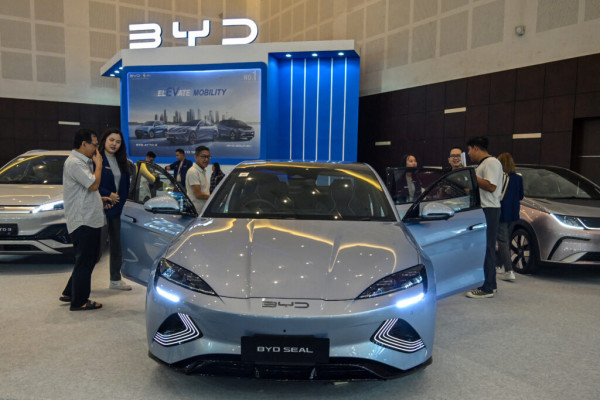Britain’s luxury carmakers fear Chinese trade war
LONDON — Britain’s big political parties all say they're worried about Chinese electric vehicles flooding the U.K. market.
But the last thing high-end carmakers say they want is a trade war.
One of the country’s leading luxury automakers fears it could become collateral damage in a tit-for-tat tariff battle with Beijing if Britain follows the U.S. and EU and imposes new duties on Chinese cars. That puts it sharply at odds with mass-market manufacturers.
“A U.K. investigation could potentially risk prompting reactive measures from China,” a senior figure in the high-end company, said. “We urge caution and encourage all parties to be aware of the risk of unintended consequences.” Like others quoted in this story, they were granted anonymity to speak frankly about a sensitive issue.
The European Commission shocked China earlier this month by slapping duties of up to 38.1 percent on electric vehicle imports. The provisional duties come after a months-long investigation into Chinese state aid to its EV-makers.
In the run-up to a July 4 election in the U.K., both Labour and the Conservatives have signaled they could follow Britain’s allies in opening a probe into the Chinese subsidies. Experts fear a flood of cheap Chinese cars diverted from the Continent to the U.K. market if Britain doesn’t match new EU tariffs.
Although no decision has been taken, British officials have already begun laying the groundwork for an investigation — and a new wave of Chinese models is primed to enter Britain's market in the next few months.
BYD, one of China’s biggest electric carmakers, says it wants to sell its entry-level model in Britain, while Vauxhall-owner Stellantis is set to market models made by China’s Leapmotor from March 2025.

A major automaker, specializing in mass-market cars, said Britain needs to launch a probe quickly after the election. “You would struggle to find an automaker [in the U.K.] who wouldn’t support an investigation to see what’s going on,” they said.
But not everyone sees it that way.
Britain counts Aston Martin, Jaguar, Land Rover, Range Rover, Bentley and Rolls-Royce among its top luxury brands.
“Policymakers simply can’t view ‘U.K. automotive’ as a homogenous bloc as they consider the U.K.’s future trading relationships,” the luxury automaker said.
Cars are the U.K.’s top goods export and China is an “important” market for luxury carmakers, they added, “where British brand heritage and quality is in high demand among middle-class consumers.”
Beijing stepped up retaliatory measures against EU exports this week after the European Commission provisionally hit some Chinese EV brands with tariffs of nearly 40 percent. The EU investigation found Chinese EVs were being unfairly subsidized throughout the supply chain by Beijing. G7 leaders warned China in recent days that its trade practices were causing “harmful overcapacity” and “market distortions."
The EU’s tariffs are meant to push Chinese automakers into forging joint ventures with European automakers, Brussels diplomats and officials told POLITICO.
China an ‘important export market’
Britain’s automotive lobby group, the SMMT, has walked a fine line on the issue.
“No [carmaker] has asked us to push the U.K. government for its own investigation,” said an SMMT spokesperson, noting the group’s members “are not raising” concerns about Chinese EVs.
China’s BYD pays for membership in the SMMT along with both luxury and mass-market manufacturers.

Even if Britain doesn’t launch an investigation “there are going to be winners and losers,” said Peter Wells, a professor at Cardiff University Centre for Automotive Industry Research.
The U.K. market could see the arrival of “a large number of Chinese vehicles which are very competitively priced,” Wells added. Different manufacturers have different priorities and serve different market segments, Wells explained, with carmakers “all in slightly different positions.”
For Jaguar Land Rover, he said, “China is an important export market. What if we get reciprocal tariffs being imposed on products coming out of the U.K.? That could easily happen and we're vulnerable to that.” But Chinese customers buying top-end luxury vehicles from JLR, Rolls-Royce and Bentley will more easily absorb extra costs, he said.
“Ultimately the danger of us trying to get involved imposing sanctions on Chinese new cars is that China controls most, or a significant proportion, of the value supply chain all the way up to battery packs,” he said, pointing to its position as the world’s dominant refiner of the critical minerals used to make EVs.
China is “not afraid to use its economic and geopolitical power” in negotiations with the West, he said. “The whole of the economy is vulnerable to that sort of intervention, which we saw already happen with semiconductors” as China slapped export controls on the critical minerals needed to produce chips.
Alternative U.K. supplies won’t be online for 10 to 15 years, Wells adds. “So I do expect us to pull back from [tariffs on China] because there is a massive issue on security of supply.”